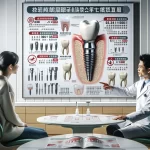Imagine waking up each morning with the confidence to smile freely, unburdened by missing teeth or uncomfortable dentures. For countless individuals, this dream has become a reality thanks to the revolutionary All-on-4 dental implant procedure. This innovative solution has transformed the lives of those struggling with tooth loss, restoring not only their smiles but also their self-assurance and quality of life. In this comprehensive guide, we will explore the world of All-on-4 dental implants, uncovering how this groundbreaking technique is changing the landscape of dental restoration.
Understanding All-on-4 Dental Implants
What Are All-on-4 Implants?
All-on-4 is a dental implant technique that provides a permanent, full-arch restoration using only four strategically placed implants. Developed by Portuguese dentist Paulo Maló in 1998, this method offers a more efficient and cost-effective solution compared to traditional implant methods.
How They Differ from Traditional Implants and Dentures
To better understand the advantages of All-on-4 implants, let’s compare them with traditional implants and dentures:
| Feature | All-on-4 Implants | Traditional Implants | Dentures |
|---|---|---|---|
| Number of Implants | 4-6 per arch | 6-8+ per arch | None |
| Surgery Time | Single-day procedure | Multiple surgeries over months | No surgery required |
| Bone Grafting | Rarely needed | Often required | Not applicable |
| Stability | Highly stable | Highly stable | Can be loose or ill-fitting |
| Maintenance | Easy to clean | Easy to clean | Requires daily removal and cleaning |
| Longevity | Long-lasting (20+ years with proper care) | Long-lasting (20+ years with proper care) | Need replacement every 5-7 years |
Key Benefits of All-on-4
Immediate Results: Patients can often receive a full set of temporary teeth on the same day as surgery.
Improved Quality of Life: Restored ability to eat, speak, and smile with confidence.
Cost-effective: Fewer implants and less complex surgery than traditional methods.
Bone Preservation: Helps maintain jawbone density and facial structure.
High Success Rate: Studies show a success rate of over 95% after 5-10 years.
Candidacy for All-on-4 Implants
Ideal Candidates
The ideal candidates for All-on-4 implants typically include:
Individuals missing most or all teeth in one or both arches.
Those with sufficient bone density to support implants.
Patients in good overall health.
Factors That May Affect Eligibility
Certain conditions may impact candidacy:
Severe bone loss
Uncontrolled diabetes
Active gum disease
Smoking habits
Certain medications or medical conditions
Self-Assessment Quiz
To gauge your potential candidacy for All-on-4 implants, consider these questions:
- Are you missing most or all of your teeth in one or both jaws?
- Are you in good general health?
- Do you have difficulty wearing traditional dentures?
- Are you looking for a long-term solution to tooth loss?
- Are you willing to undergo a surgical procedure?
If you answered “yes” to most of these questions, you might be a good candidate for All-on-4 implants. However, only a qualified dental professional can determine your eligibility through a comprehensive evaluation.
The All-on-4 Procedure: Step by Step
Initial Consultation and Planning
The journey towards receiving All-on-4 implants begins with an initial consultation that includes:
- Comprehensive oral examination
- 3D imaging and treatment planning
- Discussion of options and expected outcomes
The Surgery Process
The surgical process is typically straightforward:
- Administration of anesthesia
- Extraction of remaining teeth (if necessary)
- Preparation of implant sites
- Strategic placement of four implants
- Attachment of temporary prosthesis
Temporary and Permanent Prosthesis Placement
Temporary Prosthesis:
Fitted immediately after surgery to allow for functionality during healing.
Healing Period:
Typically lasts between 3 to 6 months.
Permanent Prosthesis:
Custom-made and fitted after healing.
Expected Timeline for Full Recovery
The recovery timeline can be broken down into phases:
| Phase | Duration |
|---|---|
| Initial Healing | 1-2 weeks |
| Soft Tissue Healing | 6-8 weeks |
| Complete Osseointegration (fusion with bone) | 3-6 months |
Recovery and Aftercare
Immediate Post-Surgery Care
After surgery, patients should adhere to the following guidelines:
- Follow a soft diet for 6–8 weeks.
- Avoid strenuous activities for 2–3 days.
- Use prescribed pain medication and antibiotics as directed.
- Maintain gentle oral hygiene with a soft-bristled brush.
Long-Term Maintenance
To ensure the longevity of your implants:
- Schedule regular dental check-ups every six months.
- Practice daily brushing and flossing.
- Consider using water flossers or interdental brushes.
- Seek professional cleaning as recommended by your dentist.
Results and Patient Experiences
Before-and-Afters Showcases
Visual evidence can be powerful—before-and-after images vividly illustrate the transformation that All-on-4 implants can provide.
Patient Testimonials
“After years of hiding my smile, All-on-4 has given me a new lease on life. I can eat, laugh, and smile without worry.” – Sarah, 52
“The procedure was much smoother than I expected. Within hours, I had a full set of teeth that looked and felt natural.” – John, 65
Case Studies
Case Study: Marie, 58
Situation: Full upper denture, partial lower denture
Challenge: Difficulty eating, low self-esteem
Solution: All-on-4 implants in both arches
Result: Restored ability to eat favorite foods; increased confidence in social situations.
Comparing Tooth Replacement Options
When considering tooth replacement options, it’s crucial to evaluate their features:
| Feature | All-on-4 | Traditional Implants | Dentures |
|---|---|---|---|
| Procedure Time | 1–2 days | 3–8 months | 2–3 weeks |
| Number of Surgeries | Usually 1 | 2–3 | None |
| Bone Grafting | Rarely needed | Often required | Not applicable |
| Immediate Teeth | Yes | No | Yes |
| Preserves Jawbone | Yes | Yes | No |
| Longevity | 20+ years | 20+ years | 5–7 years |
| Natural Look and Feel | High | High | Moderate |
| Maintenance | Easy | Easy | Moderate |
| Cost Estimate | $15,000 – $30,000 | $20,000 – $40,000 | $1,500 – $3,000 |
Potential Risks and Complications
While the All-on-4 procedure is generally safe, common side effects may include:
- Swelling and bruising
- Temporary discomfort
- Minor bleeding
Rare but Serious Complications:
- Infection
- Implant failure
- Nerve damage
- Sinus problems (for upper jaw implants)
How to Minimize Risks
To reduce potential complications:
- Choose an experienced, qualified implant dentist.
- Follow all pre-and post-operative instructions carefully.
- Maintain good oral hygiene.
- Attend all follow-up appointments.
Cost Considerations
Understanding the financial aspect is crucial when considering All-on-4 implants:
Average Cost Range for All-on-4 Implants
The cost typically ranges from $15,000 to $30,000 per arch; however, this can vary based on location and specific needs.
Factors Affecting Cost Include:
- Geographical location
- Dentist’s experience and expertise
- Need for additional procedures (e.g., extractions or bone grafting)
- Materials used for final prosthesis
Insurance Coverage and Financing Options
Many practices offer financing plans or partner with third-party financiers to help manage costs effectively.
Additionally:
Dental insurance may cover a portion of the cost.
Health Savings Accounts (HSAs) or Flexible Spending Accounts (FSAs) can often be utilized as well.
Choosing a Qualified All-on-Four Provider
When selecting an All-on-Four provider, look for:
Extensive experience with the procedure.
A portfolio showcasing before-and-after results.
Positive patient reviews and testimonials.
Continued education in implant dentistry.
Questions to Ask During Consultation:
How many All-on-Four procedures have you performed?
Can I see before-and-after photos of your patients?
What is your success rate with All-on-Four implants?
What type of technology do you use for treatment planning?
How do you handle complications if they arise?
Conclusion: A Life-Changing Solution Awaits You
All-on-Four dental implants offer a life-changing solution for those struggling with extensive tooth loss. This innovative technique provides a faster, less invasive alternative to traditional implant methods while maintaining high success rates and immediate results potential.
By understanding the procedure, recovery process, and long-term outcomes associated with All-on-Four implants, you can make an informed decision about whether this option is right for you—restoring not just your smile but also your confidence and quality of life.







